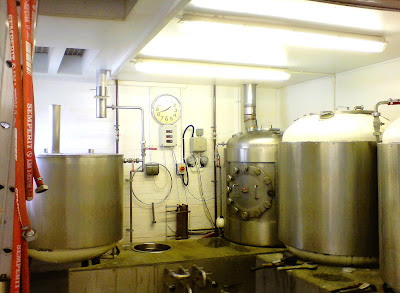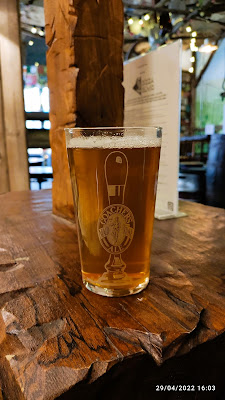Okay, it’s been six days since my last post – an article which ended with me mentioning I would be joining the local CAMRA’s on a walkabout of pubs, at the north end of Tonbridge. Well, the event went ahead, with me being one of six participants, and it was a most enjoyable evening, but I’m going to leave you hanging on a while longer in order to comment on the news of a sad, and quite unexpected brewery closure. Sheffield-based Kelham Island Brewery, has announced it will be closing later this month, following 32 years in the industry. The brewery started life in 1990, in purpose-built premises, adjacent to the Fat Cat pub at Alma Street, in the heart of Sheffield’s Kelham Island quarter. It was the brainchild of the pub’s owner, Dave Wickett, and was the first new independent brewery in the city, for over fifty years. Production at first, was around 10 barrels per week, but a new brewery in 1999, increased capacity to 50 barrels. The original building became an additional outside bar for the Fat Cat pub. In 2008, the brewery expanded again, and the weekly output increased to around 100 barrels. Kelham Island was one of the first exponents of pale, hoppy English-stye beers, with their 5.2% abv Pale Rider, winning CAMRA’s Champion Beer of Britain (CBOB) in 2004. The company also provided a fertile training ground, for aspiring brewers, with several ex-Kelham Island employees, going on to either set-up, or work with, a number of other influential breweries. These include Brewdog, Thornbridge and Welbeck.
 It is therefore doubly sad to learn that this pioneering brewery
is to close. The Fat Cat will remain open, but Kelham Island Brewery beer will
only be available on cask and in bottles while stock lasts. It is also both sad
and frustrating on a personal note, as I have a trip to Sheffield, planned for
11 days’ time, and some time spent in the Kelham Island quarter, featured high
on my priority list. I still plan to head down that way, as I will be meeting up with
pub-ticking legend, Retired Martin, and pub connoisseur, Sheffield Hatter, who
is also a pub-going legend in his own right, but the closure of Kelham Island Brewery
will put something of a dampener on the whole experience.
It is therefore doubly sad to learn that this pioneering brewery
is to close. The Fat Cat will remain open, but Kelham Island Brewery beer will
only be available on cask and in bottles while stock lasts. It is also both sad
and frustrating on a personal note, as I have a trip to Sheffield, planned for
11 days’ time, and some time spent in the Kelham Island quarter, featured high
on my priority list. I still plan to head down that way, as I will be meeting up with
pub-ticking legend, Retired Martin, and pub connoisseur, Sheffield Hatter, who
is also a pub-going legend in his own right, but the closure of Kelham Island Brewery
will put something of a dampener on the whole experience.
No official reasons have been given for the closure, and whilst there is little point in speculating, it’s worth bearing in mind that difficult trading conditions/financial problems, have been cited as responsible for two other recent closures. Beatnikz Republic– a relative newcomer on the scene plus, just the other day, Exe Valley, a brewery with almost 40 years of history behind it, and one of the first generation, new brewery start-ups, inspired by CAMRA, decided to call it a day. The problems at Beatnikz Republic seem largely financial, with Covid being a significant contributory factor. The impact of the various lock-downs, and the ensuing stop/start/stop in production, have meant lower sales than anticipated. This, coupled with the poor economic outlook, has meant the brewing side of the business is no longer viable. The Beatnikz Republic NQ Bar, in Manchester’s Northern Quarter, will continue trading as normal, as it is a separate company that is not impacted directly by the brewery’s closure.
Exe Valley’s problems appear similar in nature, with the company blaming the reality of the current economic situation for themselves, their customers, and the hospitality industry in general, for the decision to close. The brewery claim to have explored all the options and done everything they could to make things work but with so much uncertainty, had found it impossible to find a long-term solution.
The brewery was established in 1984 as Barron Brewery by Richard Barron, the former landlord of the Three Tuns pub, who converted a redundant cowshed into the brewery. In 1991, Richard was joined by Guy Sheppard, and the name of the company changed to Exe Valley Brewery. The plant was expanded and upgraded at the same time. Richard retired in 2003 and Guy ran the brewery until 2020, and then has continued to offer advice after its sale of the company to husband-and-wife team Libby and Kevin Stroud-Kroon.
On a personal note, I'm not that familiar with any of these breweries, as we rarely, if ever, see their beers on sale in this part of the country, but to see three breweries throwing in the towel in as many days is perhaps a sad indictment of the times. As many industry commentators have pointed out, these three are unlikely to be the last. So, sad times, not just for the drinkers, customers, and workers, but for the individuals behind each of these companies. All these individuals will have put their hearts, souls, and their dreams into their respective concerns, and to see everything come crashing down, must be devastating.
 Ironically, whilst researching the background to Devon-based
Exe Valley Brewery, I discovered that in March 2021, there were 45 breweries
operating in the county alone. If that doesn’t’ make the point, then I don’t
know what does. It might also go a long way towards explain why, after nearly
40 years of brewing, Exe Valley had to call it a day.
Ironically, whilst researching the background to Devon-based
Exe Valley Brewery, I discovered that in March 2021, there were 45 breweries
operating in the county alone. If that doesn’t’ make the point, then I don’t
know what does. It might also go a long way towards explain why, after nearly
40 years of brewing, Exe Valley had to call it a day.
Footnote: Following my trip to Sheffield, on 19th May, the majority of the photos on this post have been updated, and now depict all things Kelham Island. I am also pleased to report that I managed to sample two of the Kelham Brewery beers - Kelham Best and Pale Rider.
The last two photos, which originated from my library, depict micro-breweries in general, rather than any of the concerns referred to in the article.

















